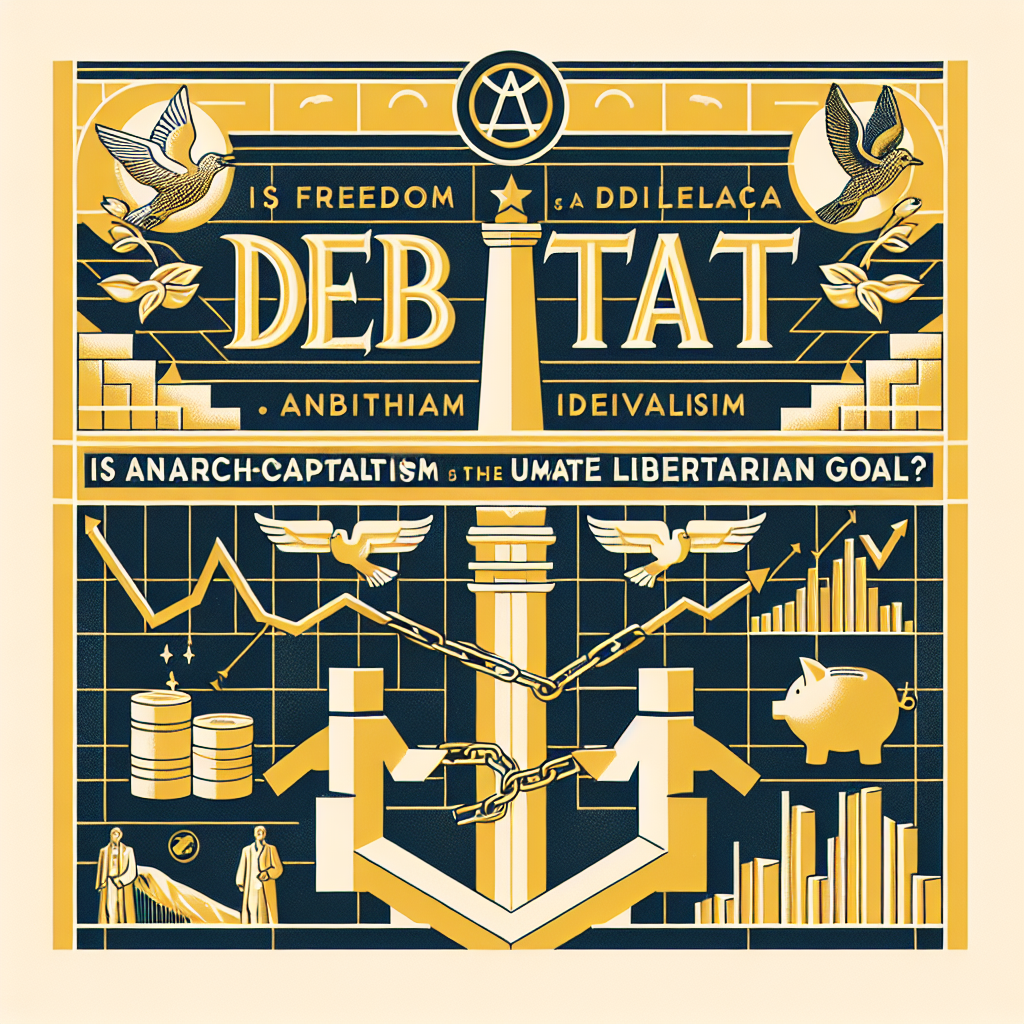Debate: Is Anarcho-Capitalism the Ultimate Libertarian Goal?
Introduction to Anarcho-Capitalism
Anarcho-capitalism (ANCAP) is a political philosophy that advocates for the elimination of the state in favor of a system of private property and free markets. Proponents argue that a society without a government would not only be possible but preferable, with voluntary transactions replacing coercive state intervention. But is anarcho-capitalism truly the ultimate goal of libertarianism? This article explores the arguments for and against this proposition.
Understanding Libertarianism
Before delving into anarcho-capitalism, it is crucial to understand libertarianism as a broader philosophy. Libertarians advocate for minimal government intervention in both personal and economic life, emphasizing individual liberty and volunteerism. While various branches of libertarianism exist, including classical liberalism and minarchism, ANCAP positions itself at the extreme end of this spectrum.
What is Anarcho-Capitalism?
Anarcho-capitalism combines anarchism’s anti-state stance with capitalism’s free-market principles. In ANCAP society, all services—be they security, legal, or educational—would be provided through voluntary transactions in a competitive marketplace. Prominent figures like Murray Rothbard and David D. Friedman spearheaded the development of anarcho-capitalist thought, critiquing state functions and advocating for private alternatives.
Key Features of Anarcho-Capitalism
-
Private Property: ANCAP philosophy is predicated on the sanctity of private property, with all resources and services owned by individuals or associations.
-
Voluntary Exchange: All interactions are based on mutual consent, aiming to eliminate coercive state influence in personal and economic matters.
- Market Solutions for Services: Security, justice, and infrastructure would be managed through market mechanisms rather than by centralized authority.
Arguments Supporting Anarcho-Capitalism as the Libertarian Goal
Absolute Freedom and Self-Determination
One of the most compelling arguments for anarcho-capitalism is its commitment to absolute freedom. Proponents assert that the absence of a state allows individuals to make choices free of coercion, respecting personal autonomy in all spheres.
Economic Efficiency
Advocates argue that a purely capitalist system encourages innovation and efficiency unmatched by government-operated services. The competitive marketplace drives improvement and leads to a more prosperous society, benefiting all citizens.
Historical Precedents
Supporters of ANCAP often cite historical examples of voluntary societies and autonomous communities as proof that order can arise without state intervention. They point to instances such as pirate communities or the medieval Icelandic Althing as early examples of self-regulation without centralized authority.
Counterarguments: Challenges to Anarcho-Capitalism
While anarcho-capitalism has its proponents, many libertarians and political theorists raise significant concerns regarding its feasibility and implications.
Security Concerns
One of the biggest criticisms of ANCAP is the potential for violence and conflict. Without a centralized authority to resolve disputes or protect citizens, there is a fear that might will make right, leading to exploitation and instability within society.
Inequality
Critics argue that a completely deregulated market would exacerbate social inequalities. Without the checks and balances provided by a state apparatus, wealth accumulation could lead to the creation of monopolies and oligarchies, diminishing true freedom for the less affluent.
Functionality of Public Goods
Many public goods—such as roads, education, and emergency services—pose a challenge for ANCAP proponents. Critics question how these essential services could be effectively provided in a purely voluntary, privatized system and fear that important areas could be neglected.
The Middle Ground: Minarchism
For many libertarians, minarchism provides a compromise between limited government and anarcho-capitalist ideals. Minarchists advocate for a "night-watchman" state, limited to protecting individual rights through a minimal government that oversees law enforcement and national defense while allowing free-market operations.
The Minarchist Perspective
Minarchists argue that some government functions are necessary to uphold the very freedoms anarcho-capitalists cherish. They believe that a minimal state can prevent abuses of power while still embracing the core tenets of libertarianism.
Conclusion: The Ongoing Debate
The question of whether anarcho-capitalism represents the ultimate goal of libertarianism remains deeply divisive. While it embodies the most radical form of libertarian thought, practical concerns about security, inequality, and public goods create a substantial counter-narrative.
As society continues to grapple with issues of state control versus individual freedom, the debate surrounding anarcho-capitalism, its merits, and its shortcomings will likely persist. Understanding this discourse allows for a more nuanced view of libertarian goals and the potential pathways toward a freer society.
By engaging critically with both sides of the debate and presenting a well-rounded analysis, this article not only captures the essential tenets of both anarcho-capitalism and libertarianism but also serves as a resource for readers seeking to better understand these complex ideologies.
Share this content:












Post Comment